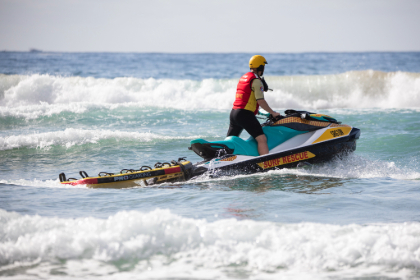INDEPENDENT DEALER
Myrtle Beach, SC | (336) 247-0212
High Point, Greensboro & Mooresville, NC
OUR BLOG
As late summer approaches in North Carolina, Mooresville Synthetic Oil helps PWC owners maximize their watercraft performance with expert jet ski maintenance tips that ensure endless fun on the water.

Late summer in North Carolina offers perfect conditions for personal watercraft enthusiasts. Warm waters and extended daylight hours create ideal riding opportunities. Proper maintenance during this peak season ensures your jet ski delivers reliable performance while protecting your investment for years to come.
Call Mooresville Synthetic Oil in Mooresville, NC, at (336) 247-0212 or visit AMSOIL's online store to save time and money on premium synthetic marine oils like AMSOIL 10W-40 100% Synthetic Marine Engine Oil designed specifically for PWC engines.
Understanding How to Maintain Personal Watercraft
North Carolina's unique climate presents specific challenges for PWC owners, from the coastal salt spray to inland lake mineral deposits. Regular maintenance becomes even more critical during late summer when water temperatures peak and engines work harder. Jet ski maintenance tips for our region should account for higher ambient temperatures, increased usage frequency, and the transition toward fall storage preparation.
The state's diverse waterways, from the Outer Banks to Lake Norman, expose personal watercraft to varying conditions that demand consistent attention. Understanding these regional factors helps owners develop maintenance routines that address local challenges while maximizing performance and longevity.
PWC Oil Changes for Peak Performance: The Foundation of Engine Health
Regular oil changes represent the single most important maintenance task for keeping your jet ski running smoothly throughout the season. Synthetic marine oils provide superior protection against the extreme conditions PWCs face, including high RPMs, moisture exposure, and temperature fluctuations.
The recommended oil change interval typically ranges from 25-50 hours of operation, though late summer's intensive use may warrant more frequent service. Key benefits of using synthetic oil include:
- Extended drain intervals compared to conventional oils
- Superior protection against corrosion and rust
- Better viscosity stability in extreme temperatures
- Reduced engine deposits and cleaner operation
- Enhanced fuel efficiency and power output
Essential Watercraft Maintenance Components
A comprehensive maintenance approach extends beyond oil changes to encompass multiple systems that work together for optimal performance. This late summer watercraft maintenance guide covers critical areas that demand attention during peak riding season.
- Cooling System Maintenance: Flush the cooling system regularly to remove debris, salt, and mineral deposits. Inspect cooling lines for cracks or deterioration, paying special attention to connections and clamps that may loosen from vibration.
- Spark Plug Inspection: Check and replace spark plugs according to the manufacturer's specifications. Late summer's heavy use can accelerate plug wear, leading to reduced performance and fuel efficiency.
- Battery Care: Marine batteries face unique challenges from vibration and moisture exposure. Clean terminals regularly and ensure proper charging to avoid unexpected failures on the water.
Call Mooresville Synthetic Oil in Mooresville, NC, at (336) 247-0212 or visit AMSOIL's e-store for storage preparation products, including fuel stabilizers and corrosion inhibitors.
Synthetic Oil Benefits for Marine Engines During Peak Season
The advantages of synthetic lubricants become particularly evident during late summer's demanding conditions. Synthetic marine oils provide protection that conventional oils cannot match, especially when engines operate at sustained high speeds in warm water.
Synthetic formulations resist thermal breakdown better than conventional oils, maintaining protective film strength even during extended full-throttle operation. This stability translates to consistent performance throughout long riding sessions while reducing the risk of engine damage from oil degradation.
Additionally, synthetic oils' superior detergency keeps internal components cleaner, preventing power-robbing deposits that can accumulate during intensive use periods.
Proper Storage Preparation While Still Riding
Even though you're actively using your PWC, late summer marks the beginning of storage preparation season. Smart owners begin gradual preparation while still enjoying their watercraft, making the eventual transition to winter storage smoother.
Start by addressing any minor repairs or adjustments now rather than waiting until season's end. Document maintenance performed and parts needed, creating a winter project list that ensures spring readiness. This proactive approach prevents small issues from becoming major problems during storage.
Performance Optimization Through Regular Inspection
Keeping your jet ski running smoothly requires vigilant observation during every ride. Develop pre-ride inspection habits that identify potential issues before they affect performance or safety. Check hull integrity, inspect the jet pump area for debris, and verify proper instrument function.
Pay attention to changes in engine sound, vibration patterns, or handling characteristics that might indicate developing problems. Early detection through regular inspection often means the difference between minor adjustments and major repairs.
Professional Service Considerations for PWC Owners
While many jet ski maintenance tips focus on owner-performed tasks, certain services benefit from professional expertise. Complex repairs, warranty-required services, and specialized diagnostics often justify professional involvement.
Establish relationships with qualified PWC technicians who understand your specific model and riding conditions. Their expertise complements your regular maintenance efforts, ensuring comprehensive care that maximizes reliability and performance.